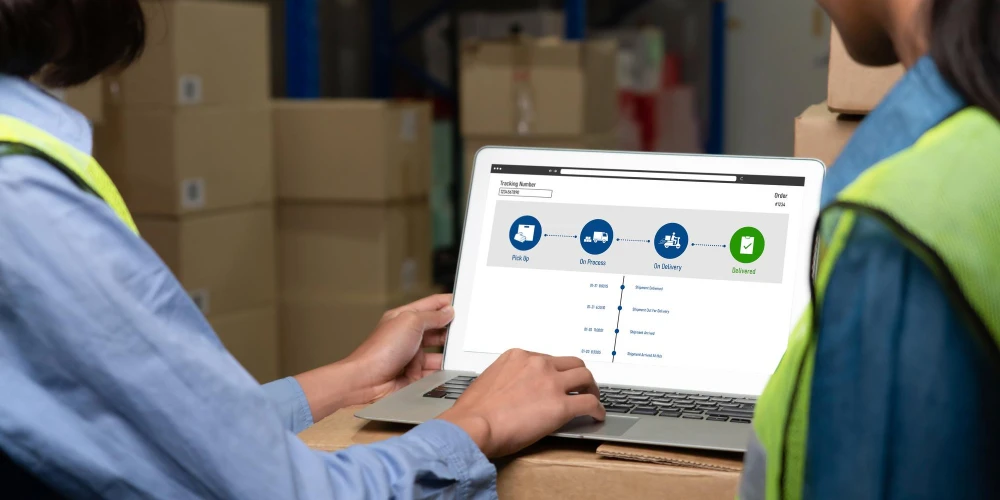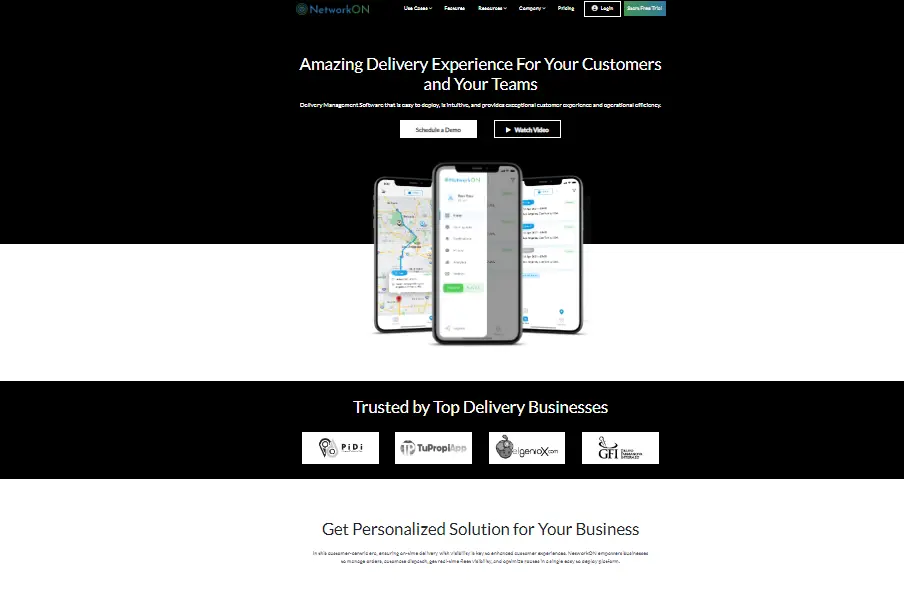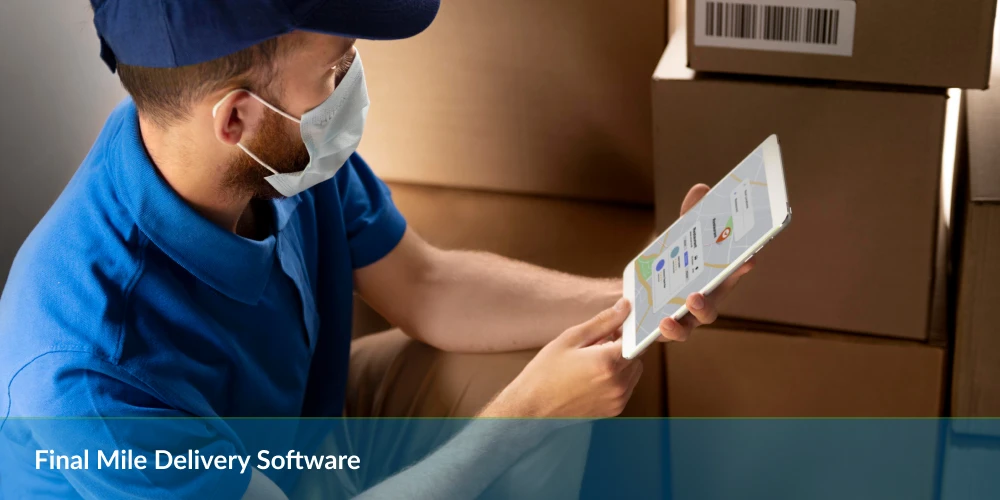Table of Contents
In the contemporary global commerce scenario, we cannot underestimate the role of Logistics Management Software. As international trade continues to evolve at an accelerated pace, the efficient coordination and management of logistical processes have emerged as paramount concerns for freight forwarders and carriers worldwide.

For professionals in the logistics sector, the importance of logistics software cannot be overstated. By integrating this software into their operations, freight forwarders and carriers can ensure higher accuracy, improve efficiency, and save costs, thereby driving their businesses forward. Logistics Management Software serves as the digital backbone of a logistics company, enabling better decision-making and more effective resource management.
We are witnessing a significant shift from conventional, manual logistics methods to cutting-edge digital solutions. This digital transformation is not just a trend; it’s a crucial step for companies that wish to survive and flourish in the modern age of logistics. Embracing software for logistics is becoming more of a necessity than a choice, marking the difference between leading the market and struggling to keep up.
Top 10 Logistics Management Software to use in 2024
| Best Features | Limitations | Pricing | Ideal for | Ratings on Capterra | |
| NetworkON | Real-time Tracking,Route OptimizationInventory Management | May require training for full utilization | Starting from $16/month ensuring 150 jobs (Additional jobs at $0.13) | Businesses of all sizes, including logistics operations requiring streamlined task organization | 5/5 |
| ClickUp | Task Management,Time Tracking Customizable Workflows | Steep learning curve for new users, occasional performance issues | Freemium model with tiered pricing | Small to medium-sized businesses with complex supply chain networks | 4.6/5 |
| Upper | Inventory ControlWarehouse Layout OptimizationOrder Processing Automation | Limited scalability for very large warehouses, integration complexities | Subscription-based pricing with tiered plans | E-commerce businesses seeking efficient order fulfillment and inventory management solutions | 4.5/5 |
| MasterBorn | End-to-end Supply Chain ManagementFinancials Integration Scalability | High initial setup costs, may require customization for specific workflows | Custom pricing based on business requirements | Designed for large-scale manufacturing enterprises optimizing production | Not enough ratings |
| NetSuite Cloud ERP | Customer Relationship ManagementSales AutomationCustomizable Dashboards | Cost-prohibitive for small businesses, steep learning curve | Not mentioned on the Website | businesses looking to streamline logistics alongside finance | 4.1/5 |
| Salesforce | Inventory TrackingOrder Picking OptimizationIntegration Capabilities | Limited out-of-the-box logistics functionality, requires extensive customization | Subscription-based pricing with various editions | Businesses focusing on customer-centric logistics operations | 4.1/5 |
| Excalibur WMS | Supply Chain AnalyticsTransportation ManagementVendor Collaboration | Limited support for advanced analytics, occasional bugs | Custom pricing based on warehouse size and requirements | Businesses with intricate inventory handling needs | 4.4/5 |
| Axellero | Inventory TrackingOrder ManagementIntegration With Quickbooks | Integration challenges with legacy systems | Not mentioned on the Website | Businesses operating in global supply chains | 4.8/5 |
| Fishbowl | Financial ManagementSupply Chain OptimizationCRM Integration | Limited scalability for large enterprises, basic reporting capabilities | Subscription-based pricing with add-on modules | Businesses needing seamless integration with QuickBooks and other accounting systems | 4.1/5 |
| Oracle Netsuite ERP | Real-time trackingRoute optimizationInventory management | Complexity may overwhelm small businesses, high initial investment | Subscription-based pricing with customization options | Large enterprises with complex logistics requirements | 4.1/5 |
What makes NetworkON different from others Logistics Management Software?
NetweorkON stands out among logistic management software options due to its comprehensive suite of features tailored for seamless operations. Unlike its competitors like ClickUp, Upper, and MasterBorn, NetweorkON excels in route optimization, geofencing, and fleet visibility management, ensuring efficient and timely deliveries. Its advanced performance analytics empower users with insightful data for informed decision-making, surpassing the capabilities of Salesforce and Excalibur WMS.

NetweorkON’s auto-assignment feature streamlines tasks, while its robust role manager enhances security and delegation, features absent in Axellero and Fishbowl. Notably, NetweorkON integrates seamlessly with Oracle Netsuite ERP, providing a holistic logistic solution. With NetweorkON, businesses gain a competitive edge through optimized routes, heightened security, and actionable insights, making it the premier choice for logistic management in today’s dynamic market landscape.
The Pillars of Logistics: Visibility and Management
Effective logistics’s core lies the twin pillars of visibility and management. In today’s fast-paced market, overseeing and controlling the flow of goods from the point of origin to the point of consumption is paramount. Logistics management software is crucial for businesses to uphold these principles, providing much-needed transparency and refinement of operations.
The Role of Software in Enhancing Supply Chain Visibility
Supply chain visibility is vital to logistics management. With the integration of sophisticated logistics management software, companies can now track and monitor their products at every stage of the supply chain in real time. This transparency boosts operational efficiency and enhances decision-making, risk management, and customer satisfaction by providing insightful and actionable data.
Streamlining Inventory Management with Technology
The advent of logistics technology has revolutionized inventory management. Logistics management software provides unprecedented detail in inventory tracking, ensuring optimal stock levels and reducing instances of overstocking or stockouts. This, in turn, minimizes wastage, saves costs, and perfects the balance between supply and demand.
Advances in Warehouse Management Systems (WMS)
Continual advances in Warehouse Management Systems (WMS) have introduced unparalleled efficiency within warehousing operations. A sophisticated WMS within logistics management software empowers companies to optimize space utilization, streamline the picking and packing processes, and reduce errors in order fulfillment.
Optimizing Movement: Transportation Strategies
Efficiently moving goods is at the heart of logistics management. With the right transportation strategies, logistics can transform from a cost center to a source of competitive advantage, and logistics management software plays a crucial role in this transformation.
Transportation Management Systems (TMS) and Efficiency
Transportation Management Systems are designed to streamline the planning, execution, and optimization of the physical movement of goods. This logistic software facilitates the efficiency of transport operations by ensuring that the best shipping methods and carriers are selected, freight rates are controlled, and shipments are consolidated whenever possible.
Route Planning and Optimization Solutions
Intelligent route planning and optimization solutions provided by logistics management software ensure that goods are delivered through the most efficient paths. The logistic software minimizes miles driven and improves fuel efficiency by considering traffic patterns, delivery windows, and truck capacities.
Real-Time Tracking and Tracing for Informed Decisions
Complete visibility into the transportation process is made possible with real-time tracking and tracing features. This level of insight allows managers to make proactive decisions, respond to unforeseen circumstances, and keep customers informed about the whereabouts of their cargo.
Benefits of Fleet Management Software for Shippers
- Asset Utilization: Maximize the usage of vehicles and drivers.
- Cost Reduction: Lower maintenance expenses and fuel consumption.
- Regulatory Compliance: Adhere to safety and environmental regulations.
- Risk Management: Lessen the risk of accidents and cargo theft.
- Customer Service: Improve delivery reliability and customer satisfaction.
Incorporating the right logistics management software into your operation does more than improve transportation. It transforms it into a pivotal element of your business strategy that drives growth, reduces costs, and enhances service quality.
Order to Cash: Securing the Business Cycle
Ensuring a smooth order-to-cash process is a cornerstone of effective logistics management. Robust logistics management software plays a pivotal role in streamlining this process, thus securing the business cycle. It’s not just about fulfilling orders; it’s about enhancing the overall financial health of your enterprise. Let’s delve into the key aspects that fortify the journey from order placement to revenue realization.
Order Management for Seamless Operations
Efficient order management lies at the heart of a successful logistics strategy. A sophisticated logistics management application integrates end-to-end order tracking, ensuring transparency and expediting fulfillment. With real-time data, businesses can respond promptly to demand changes and customer needs, mitigating delays and optimizing turnaround times.
The Financial Aspect: Freight Audit and Payment Systems
The reconciliation of freight bills and payments is a critical financial component that must be considered. Logistics management software automates this process, allowing for accurate auditing, timely payments, and cost control. The ability to detect billing discrepancies and process payments swiftly translates into substantial savings and a more effective financial workflow.
Carrier Selection and Rate Management Explained
Selecting the right carrier and managing freight rates demand meticulous attention and strategic decision-making. Logistics software provides tools to compare rates, evaluate carrier performance, and ensure contracts meet service expectations. Such capabilities empower businesses to negotiate better terms, reduce shipping costs, and maintain high service levels.
Ensuring Compliance and Security in a Digital Age
Maintaining compliance and security is non-negotiable in an era where digital transactions are paramount. A top-tier logistics management platform adheres to industry regulations. It ensures that all data exchanges are secure against cyber threats. Compliance checklists, audit trails, and robust encryption are part of the software’s defensive arsenal, providing peace of mind in a progressively digitized logistics landscape.
- Order Management: Tracking from placement to fulfillment
- Financial Integrity: Freight audit automation and payment processing
- Carrier Oversight: Comprehensive selection and rate management tools
- Regulatory Compliance: Robust protocols for a secure digital environment
Pro Tip:
Optimize your order-to-cash cycle with integrated logistics software, ensuring seamless operations from order placement to revenue realization while safeguarding financial integrity and regulatory compliance in a digitally driven logistics landscape.
Building and Maintaining Customer Relationships
Customer Relationship Management (CRM) in Logistics is exceptionally important in creating sustainable business growth. Logistics companies can ensure high-level satisfaction and loyalty by systematically tracking and managing customer interactions. Integrating CRM with logistics management software allows companies to maintain detailed customer profiles, leading to personalized service and heightened support.
One of the primary roles of logistics software in customer relationship management is delivering value to customers with accurate deliveries. Timely and accurate deliveries are non-negotiable in today’s fast-paced market. Customers expect to receive their orders on time and in perfect condition. An advanced logistics system can provide real-time tracking and updated ETAs, keeping customers informed at every stage of the delivery process.
The Advantages of Integrating CRM into Logistics Software include streamlined operations, improved communication, and better service quality. When CRM is part of the logistics software, all customer-related data is accessible within the system used to manage operations. This results in a cohesive workflow where customer insights can directly influence logistical decisions, thus enhancing overall efficiency and customer satisfaction.
- Enhanced data accuracy leads to fewer errors in shipping and delivery.
- Automated customer notifications and updates, improving the transparency of the logistical process.
- In-depth analytics on customer behavior and preferences, enabling tailored service offerings.
By recognizing the significance of Building and Maintaining Customer Relationships through effective logistics management software, companies pave the way for meeting and exceeding customer expectations. This strategic focus on client relationships creates a competitive edge and fosters enduring partnerships.
The Analytical Edge: Data-Driven Logistics
The era of guesswork in logistics management is rapidly coming to an end. Today, logistics management software empowers organizations with a powerful tool, i.e., data analytics. The use of analytics and comprehensive reporting is pivotal in harnessing the full potential of logistics data, transforming operations from reactive to proactive, and ensuring a significant competitive edge.
The Importance of Analytics and Reporting
By incorporating advanced analytics into their operations, logistics managers gain invaluable insights into every facet of the supply chain. Analytics offer a high-resolution view of the complete logistics landscape, enabling decision-makers to identify trends, forecast demands, and detect inefficiencies accurately. With data at their fingertips, they can make informed decisions that drive efficiency, reduce costs, and improve overall performance.
How Data Insights Transform Transport and Deliveries
Data-driven insights have revolutionized the way transport and deliveries are managed. Predictive analytics allow for better route planning and load optimization, leading to faster delivery times and reduced fuel consumption. Real-time tracking translates to enhanced visibility and immediate responsiveness to on-the-road occurrences. Furthermore, strategic analysis of delivery data can reveal patterns that inform future improvements, leading to a continuous cycle of refinement in logistics processes.
- Route Optimization: Leveraging historical and real-time data to determine the most efficient pathways.
- Load optimization involves using data to understand the best ways to combine shipments, reduce costs, and minimize environmental impact.
- Delivery Performance Analysis: Measuring outcomes to continually adapt and enhance the delivery strategy.
- Predictive Maintenance: Anticipating equipment issues before they occur, preventing delays and expensive repairs.
Embracing data-driven logistics with advanced logistics management software isn’t just about keeping up; it’s about leading the way in a tech-dominated industry. Companies that invest in analytics gain the profound ability to navigate the present and strategically plan for the future.
Embracing the New Tech Era in Logistics
In an industry where efficiency and accuracy are paramount, the advent of new technologies presents vast opportunities for innovation. Logistics management software stands at the forefront of this technological revolution, offering businesses the tools to stay ahead in a dynamic market.
Below, we delve into the critical advancements shaping logistics’s future.
Cloud-based Logistics Solutions for Modern Businesses
Cloud-based logistics solutions provide unparalleled flexibility and scalability. These systems enable real-time data access, improved collaboration, and the elimination of costly hardware investments. As a result, businesses can adapt swiftly to market demands while reducing operational costs.
Integration with IoT and Smart Devices for Smart Logistics
Integrating the Internet of Things (IoT) with logistics software transforms how goods are monitored throughout the supply chain. Smart devices provide actionable insights into tracking product location, condition, and movement, thus enhancing transparency and enabling proactive management.
Adapting to Software Innovations for Competitive Advantage
In today’s competitive landscape, the ability to swiftly adapt to software innovations is a defining factor for success. New functionalities such as predictive analytics, automation, and artificial intelligence are pushing the boundaries of what’s possible in logistics management. Companies that embrace these changes gain a significant competitive advantage through optimized operations and strategic decision-making.
By leveraging cutting-edge logistics management software, businesses are streamlining operations and charting a course toward a more connected, intelligent, and efficient future.
The Logistics Software Ecosystem
In the age of rapid technological advancement, the logistics software ecosystem has become the backbone of modern supply chains. This interconnected network is designed to streamline every facet of logistics management, integrating various functional systems into a cohesive whole.
The Interplay Between Different Software Solutions
It’s not a single piece of software that powers logistics operations but a robust suite of interconnected applications. Each software solution plays a role, from warehouse management systems to transportation management. By communicating and sharing data, they create a seamless flow of information and allow businesses to act with agility and precision.
Understanding How Inventory Management Fits into Software Systems
Inventory management is critical to logistics software, ensuring the right products are at the right place and time. Sophisticated logistics management software tracks inventory levels, manages stock replenishment, and provides real-time visibility to minimize stockouts or excess inventory holding costs.
Gearing Up for the Future with Smart, Connected Goods Management
- IoT Integration: Integrating the Internet of Things (IoT) with logistics software promises smart, connected goods management, enabling new levels of efficiency and insight.
- Real-time Data Analysis: With real-time tracking and sensor data, logistics managers can monitor the condition and location of goods as they move through the supply chain, making informed decisions to optimize delivery and reduce risk.
- Automation: Driving ahead, automation within logistics software reduces the need for manual intervention, propelling accuracy, and throughput in processes like picking, packing, and shipping.
Integrating various logistics components into an intelligent software ecosystem heralds a new era of streamlined and error-resistant operations. Choosing the right logistics management software is more than a simple selection; it’s a strategic decision that can define a company’s operational success.
Selecting the Right Logistics Management Software
Selecting the right logistics management software can be a turning point for your business. It’s not merely about tracking transportation; it’s about streamlining your operations, maximizing efficiency, and enhancing customer satisfaction. But with many options, how do you make the right choice? Below, we explore the key considerations to ensure you invest in a solution that aligns with your logistics needs.
Customization and Scalability: Adapting to Business Needs
For an effective logistics solution, it’s essential to have both customization and scalability. Customization tailors the software to fit your business’s specific processes. At the same time, scalability ensures it can expand seamlessly as your business grows, managing increased demand effortlessly. Look for a platform that enables you to integrate additional features or modules as your business evolves.
The Return on Investment (ROI) of Implementing Logistics Management Software
Calculating the ROI of logistics management software can be complex. Still, it involves analyzing cost savings and improvements across your operations. Reduced errors, improved delivery times, and better resource allocation are just a few metrics where logistics software can have a measurable impact. Intangible benefits like customer satisfaction and competitive advantage should also be considered when assessing the true ROI.
Ensuring Success: Implementation and Onboarding of Your Logistics Management Software
Logistics management software is a game-changing tool that transforms your entire supply chain operation. However, realizing its full benefits hinges on a well-executed implementation and onboarding process. This step is crucial: a misstep can lead to lost time, frustration, and reduced ROI. Let’s delve into the essentials for a seamless transition to your new logistics software.
Steps for Smooth Implementation of Logistics Software
- Detailed Planning: Begin with a comprehensive plan. Outline the objectives, timeline, and key milestones for your software implementation. Ensure every team member knows what is expected.
- Customization and Integration: Tailor the software to your business needs and integrate it with existing systems to maintain data consistency and workflow continuity.
- Data Migration: Migrating data is critical. It must be done with care to ensure data integrity and security.
- Testing: Before going live, rigorously test the software with real-world scenarios to ensure all features operate as needed.
Training Staff and Encouraging Adoption
- Comprehensive Training: Provide thorough training to familiarize your staff with the new system. Good training leads to better adoption and fewer errors.
- Ongoing Support: Offer continuous support and additional training sessions to address concerns and ensure the team is confident using the new system.
- Incentives for Adoption: Link the new system’s usage to incentives to encourage staff use, thus fostering a faster and more willing adoption.
Handling Transition Challenges from Traditional to Digital
The transition from traditional to digital systems in logistics can be daunting. Resistance to change is natural, but it can be offset by highlighting the long-term benefits of the new software. Stress the importance of modernization for competitive advantage and reassure your team through open communication. Monitor progress and feedback, adapting your approach to address any pain points during the switch.
A considered approach to the implementation and onboarding phase of your new logistics management software is vital. With attention to detailed planning, thorough training, and careful management of the transition phase, your organization will be well-equipped to reap the extensive benefits such a software solution can bring.
Looking Ahead: The Future of Logistics Management
As we look toward the horizon, it is clear that the logistics management landscape is poised for significant transformation. Driven by relentless innovation and a commitment to efficiency, the future of logistics management is an exciting frontier filled with potential and promise.
Innovations on the Horizon for Logistics Software
The next wave of logistics management software is set to revolutionize the industry with groundbreaking innovations. We are entering an era of even smarter, more interconnected systems that promise to unlock unprecedented levels of efficiency. Here are some key innovations to watch out for:
- Advanced analytics and Artificial Intelligence (AI): The integration of AI will enable predictive analytics, transforming data into actionable insights and allowing businesses to anticipate logistics needs and challenges before they arise.
- Internet of Things (IoT) and Real-Time Tracking: IoT devices will provide real-time tracking of goods across the entire supply chain, ensuring moment-to-moment precision in logistics management.
- Automated and Autonomous Vehicles: The rise of automation will increase the use of drones and self-driving vehicles for last-mile deliveries and large-scale shipping operations.
Preparing for the Evolution of Customer Expectations
As technology evolves, so do customer expectations. The future of logistics demands adaptability to meet and exceed these evolving expectations. Companies will need to leverage logistics management software that offers:
- Enhanced delivery options and speed
- Greater transparency and tracking capabilities
- Improved communication channels for real-time updates and support
The Continuous Journey of Improvement in Freight Forwarding
Freight forwarding is an essential component of global trade and is on a continuous journey toward improvement. Embracing innovations in logistics management software is critical for forwarders to remain competitive in an ever-changing global market. As we look forward, we can anticipate:
- Enhanced Integration: More seamless integration across different transportation modes and carriers to simplify the complex logistics of global freight forwarding.
- Compliance and Security: Improved features for regulatory compliance and security ensure that freight forwarders can confidently navigate the complexities of international trade.
- Collaboration Platforms: The development of platforms that facilitate more effective collaboration between freight forwarders, carriers, and customers.
The logistics landscape is advancing excitingly, and logistics management software sits at its heart. This software is not merely a tool but a driving force shaping the future of logistics management for years to come.
Key Takeaways
- Implementing the right logistics management software is not just about tracking transportation; it’s about streamlining operations, maximizing efficiency, and enhancing customer satisfaction.
- Advanced analytics and reporting capabilities empower logistics managers to make informed decisions, optimize routes, forecast demands, and detect inefficiencies accurately.
- Embracing innovations such as AI, IoT, and automation ensures businesses stay ahead in a dynamic market, offering greater efficiency, transparency, and adaptability to meet evolving customer expectations.
- Choosing logistics software that allows for customization, integration with existing systems, and scalability ensures it can grow with your business and effortlessly adapt to changing needs.
- A well-executed implementation and onboarding process is crucial for realizing the full benefits of logistics software. Thorough planning, customization, data migration, staff training, and ongoing support are essential for a smooth transition.
Conclusion
Strategic logistics planning underpinned by superior software solutions emerges as the linchpin of longevity and prosperity in the logistics domain. Those who embrace these digital advancements will find themselves equipped with the agility and insight to navigate and capitalize on the dynamics of global supply chains. As logistics management software continues to evolve and integrate with emerging technologies, its role as the integrator of operations, orchestrator of efficiency, and the architect of customer satisfaction becomes increasingly central to achieving long-term strategic gains.
As we reach the end of our comprehensive journey through logistics management software, the pivotal role of these sophisticated systems in steering the logistics industry toward efficiency, reliability, and scalability stands undeniably clear. In a world where timing is paramount and the global market is unforgiving, these tools are no longer just a convenience. They are a requisite for survival and growth.
Throughout this exploration, we’ve seen how logistics software fortifies the pillars of modern supply chains, enhancing visibility for better decision-making, streamlining management practices to heighten productivity, and unleashing transportation strategies that dovetail with organizational goals. At every turn, this smart technology simplifies complex tasks. It predicts and paves the way forward, enabling enterprises to leapfrog over traditional hurdles and stay ahead of the competition.
So don’t get left behind. Discover the transformative power of logistics management software tailored to meet your needs with NetworkON. With years of expertise, we understand the importance of advancing your business with technology that provides unparalleled visibility and management over your operations.
Contact us today to join the ranks of successful businesses optimizing their operations with the right software.
Frequently Asked Questions
What is logistics management software, and how does it benefit businesses?
Logistics management software is a digital solution designed to streamline and optimize supply chain operations, including inventory management, transportation planning, and order fulfillment. By integrating this software into their operations, businesses can achieve higher accuracy, improve efficiency, reduce costs, and enhance customer satisfaction by ensuring timely deliveries and better resource management.
How does logistics management software contribute to supply chain visibility and efficiency?
Logistics management software plays a crucial role in enhancing supply chain visibility by providing real-time tracking and monitoring of products at every stage of the supply chain. This transparency enables businesses to make informed decisions, mitigate risks, and optimize resource allocation. Logistics software improves operational efficiency by streamlining inventory management, transportation planning, and order fulfillment processes. It helps businesses meet customer demands more effectively.
What factors should businesses consider when selecting logistics management software?
When selecting logistics software, businesses should consider customization, scalability, integration capabilities with existing systems, advanced analytics and reporting features, and ease of implementation and onboarding. Choosing a solution that aligns with the business’s specific needs and goals is essential. It can adapt to future changes and growth.
How can businesses successfully implement logistics management software?
Ensuring the successful implementation of logistics software requires thorough planning, customization, data migration, staff training, and ongoing support. Businesses should develop a detailed implementation plan outlining objectives, timelines, and key milestones. Customizing the software to fit the business’s unique processes and integrating it with existing systems is essential for maintaining workflow continuity. Comprehensive training and continuous support for staff members are crucial for fostering adoption and maximizing the benefits of the new software.





0 Conversations